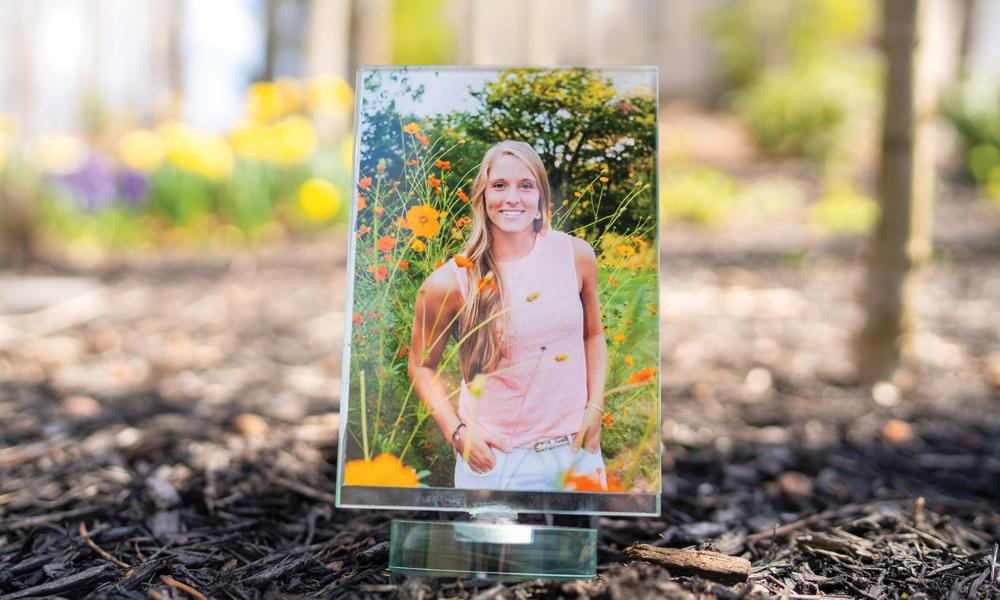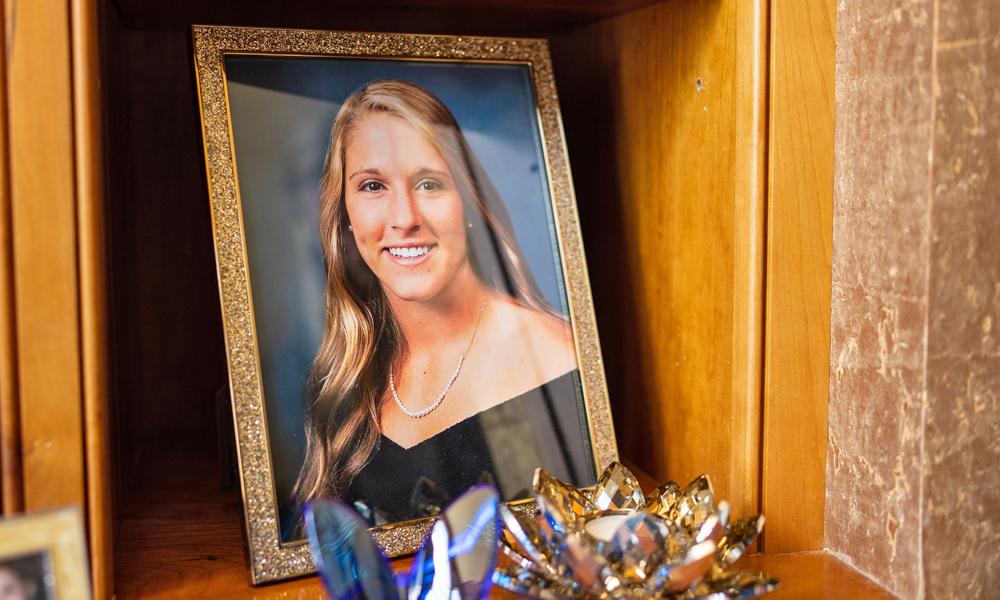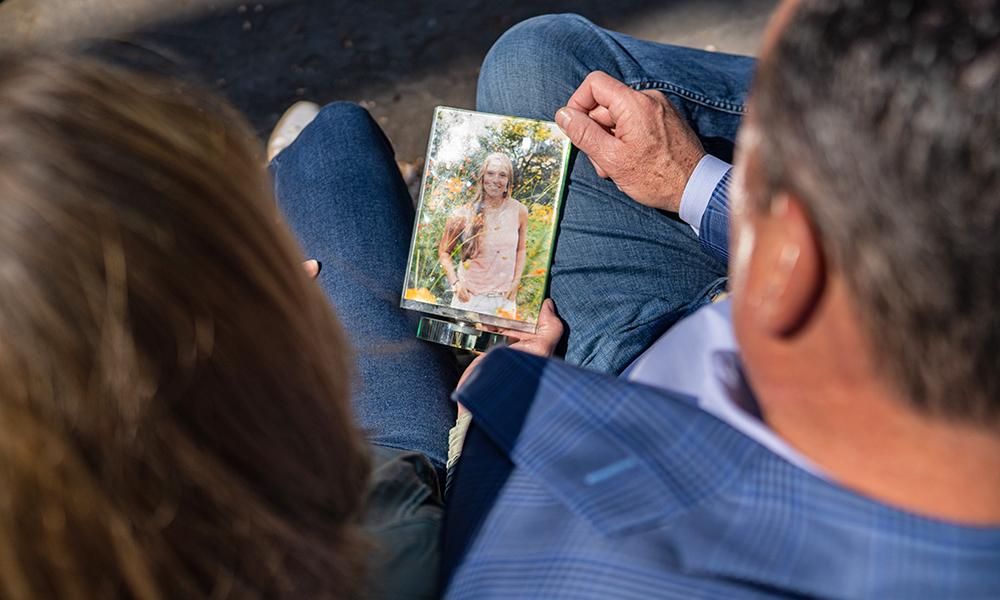Alumni couple carries on daughter’s legacy
Rodgers family launches nonprofit to end mental health stigma among student-athletes
News
SUMMARY: Morgan’s Message, a nonprofit organization co-founded by JMU alumni Kurt ('89) and Dona ('88) Rodgers in memory of their daughter — former Duke University lacrosse player Morgan Rodgers — seeks to eliminate the stigma surrounding mental health within the student-athlete community and equalize the treatment of physical and mental health in high school and collegiate athletics.
Editor's Note: This story, and the video below, were created, edited and finalized prior to the death of JMU softball player Lauren Bernett in April. If you, or someone you know, needs additional mental health support, contact the JMU Counseling Center at (540) 568-6552 or the Dean of Students Office at (540) 568-6468.
By Jim Heffernan (’96, ’17M)
Outside of Kurt (’89) and Dona (’88) Rodgers’ home near Warrenton, Virginia, there is a sitting garden with a stone in the shape of the head of a lacrosse stick. It looks out on the yard where their daughter Morgan, an all-American lacrosse and field-hockey player at Kettle Run High School, spent hours honing her skills with earbuds piping in her favorite tunes.
On May 27, 2020 — what would have been Morgan’s 23rd birthday — the Rodgers family invited her closest friends over to share stories and continue searching for answers.
“It had been not quite a year since we lost Morgan, and we were all still grieving,” Dona Rodgers recalled. “We were trying to figure out what went wrong. How did we miss this? She never said anything. How come she never reached out to the counselors who were presented to her?”
As they talked, the picture became painfully clear: For all the focus on mental health in today’s society, the subject is still out of bounds for student-athletes.
“You’re watching a game and the quarterback falls on his throwing wrist or a running back tears his ACL. There’ll be a group of trainers and doctors there within 10 seconds,” said Kurt Rodgers, an avid JMU sports fan. “Or if you say you have a pulled hamstring, you’re on the sideline and it’s expected that you’ll receive medical attention.
“But mental health is not treated the same way. If you say, ‘I just need a break. I’m not well,’ it’s like ‘C’mon, you gotta tough it out. Get back in the game.’”
His wife agreed. “Mental health challenges are invisible,” said Dona Rodgers, who briefly competed in varsity gymnastics as a freshman at JMU before injuring her shoulder. “You can kind of hide them. But you can’t hide a sore shoulder. You can’t hide a broken limb.”
Morgan’s parents and former teammates knew something had to change, so they created a podcast so student-athletes could share their struggles with mental health. “We said, ‘Let's get these people together,’” Dona said. “‘Let's tell these stories so that people will realize they’re not alone.’”
‘She had that spark’
Asked to describe Morgan, Dona Rodgers said, “In a way, she was your average, all-American girl. She grew up in a loving family with loving parents, a twin sister, a brother, 16 cousins. She was kind, thoughtful, talented, smart and fun to be around.”
“She could fling sarcasm with the best of ‘em,” added Kurt Rodgers. “She was also a great friend and teammate.”
Morgan hit the books with the same passion she exhibited on the field. “She had that spark,” her mom said. “We recognized it before she could even walk. She was determined, focused and driven.”
 |
As a senior in high school, Morgan had no fewer than 15 offers to play Division I college lacrosse. She chose Duke University, a premier lacrosse program with quality academics and a small-school feel. Her parents were especially impressed with the team’s down-to-earth coach, who wanted to graduate women leaders, not just lacrosse players. Based on their experiences, they encouraged Morgan to have a backup plan in case her athletic career didn’t work out. In Fall 2015, Morgan enrolled with future plans to attend graduate school and become a sports psychologist.
By her sophomore year, Morgan was developing into a standout player on the varsity lacrosse squad and was only two or three votes shy of becoming team captain — an honor normally reserved for juniors and seniors.
The unthinkable happens
In January 2017, 10 days before the Blue Devils’ first game of the spring season, Morgan shattered her knee in practice during a dodging drill. She underwent a surgery, which was followed by 12 months of rest and rehabilitation. “In typical Morgan fashion, she treated the injury like she did anything else,” Dona Rodgers said. “She was committed to getting back on the field.”
That fall, her parents started to notice signs of fatigue and personality changes, but they weren’t overly concerned. “She continued to rehab six days a week,” Dona said. “She was still going to team meetings and keeping her grades up.”
But one year after her injury, her recovery wasn’t as far along as the team’s training staff had hoped. She could run, but not at full speed. Her grades started to slip. “I could see she was getting discouraged” about the prospect of not being able to play in Spring 2018,” Dona said. Depression began to creep in.
In March of that year, Morgan asked to take a semester off and was granted medical leave by the university. She returned to campus in Fall 2018, but could no longer physically compete at the varsity level. Without the schedule, the camaraderie and the thrill of competition, she felt like she didn’t fit in. She closed herself off from friends and loved ones.
In 2019, after a family beach vacation over July 4th weekend, Morgan told her parents she needed to return to her apartment to pick up a few things and would join them at home the next day. But the days turned into a week, and they still had not heard from her. Kurt and Dona began to fear the worst, and they asked local police to do a safety check. Then late that night, they got in the car and drove the four hours to Durham, North Carolina. They were about an hour outside the city limits when they received a phone call that no parent wants to receive. Morgan’s body had been found in her apartment. Her death was labeled a suicide.
 |
In the weeks and months that followed, Kurt and Dona Rodgers dealt with the grief in different ways.
Kurt tried to keep himself busy at his civil contracting firm and at home. “I think I probably cut my grass every day for three weeks,” he said. “And my company … the leadership team was perfectly capable of continuing the business without me. But I needed to be in the office. I needed the distraction. I didn’t want to have to think about what took place 24 hours a day, every day.”
Dona, meanwhile, went into a self-imposed exile. “I just wanted to stay home,” she said. “I’ve always been a very busy person [who] needed something from one minute to the next. That’s where I’m comfortable. But that stopped. … I had a big support system that kept trying to get in, and I kept pushing them away.”
In time, she sought out one of Morgan’s former counselors. “I wanted to talk to someone [who] knew her. I had to talk about what we missed and why we missed it.”
Mental illness fills your brain with lies, Dona said. “It told Morgan that what she was feeling was something that she should not share with anyone. It told her that she could handle it by herself. It told her that she was a burden. And then ultimately it told her that [ending her life] was the best route for her.”
Morgan’s Message
From an idea hatched in the Rodgers’ front yard in 2020, Morgan’s Message has grown into a 501(c)(3) nonprofit organization with a staff of 18 dedicated people, a board of directors and more than 600 volunteer student ambassadors in 32 states who advocate for mental health on their campuses and in their communities. The podcast series, “The Mental Matchup,” is in its third season with more than 40 published episodes.
Morgan’s Message seeks to eliminate the stigma surrounding mental health within the student-athlete community, to equalize the treatment of physical and mental health in high school and collegiate athletics, and to normalize conversations on the topic. The organization partners with mental health professionals to serve as guest speakers at events and teams up with other student-athlete advocacy organizations like The Hidden Opponent.
The women’s lacrosse program is among the JMU sports teams that have embraced Morgan’s Message.
Head coach Shelley Klaes (’97) tried to recruit Morgan when she was in high school, and several former and current players, including Halle Duenkel (’20) and senior goalkeeper Molly Dougherty (’22), grew up in Northern Virginia and knew about Morgan’s Message. Six players currently serve as student ambassadors for the organization.
Klaes said the program rallied behind Morgan’s Message after the spring 2020 season was interrupted because of the COVID-19 pandemic.
“The girls were feeling isolated, and mentally it was a really tough time,” she said. “The whole concept of mental toughness … I mean, we were in it in that moment, and we thought it was the perfect way for the team to connect to something larger than themselves. And to have the opportunity to try to break down that stigma, to say it’s okay to talk about it, it’s okay to feel weak. The girls just really connected to it.”
The program has twice hosted Morgan’s Message games at JMU, with Kurt and Dona Rodgers serving as honorary team captains and the players sporting the organization’s butterfly logo.
Other high school and collegiate athletics programs in the region have also joined the cause, including the University of Virginia, whose field hockey team promoted Morgan’s Message during a game against JMU in March 2021. The Duke University football team wore the logo on their helmets last season.
For Tarah Markell, a junior Hospitality Management major at JMU, Morgan’s Message is personal. She grew up playing sports in the same area as Morgan and knew her well. “She was like a big sister to me,” she said.
Markell, who played club rugby her freshman year, seeks out student-athletes at club and varsity levels and invites them to engage in discussions about mental health. “We have group messages where we just talk,” she said. “It’s like, ‘Hey, I’m not feeling great today,’ or ‘My seasonal depression is kind of kicking in. What do you guys do to help cope?’”
Markell’s roommate, junior Education major Lexi Diaz, would like to see more JMU sports teams — and college students in general — embrace Morgan’s Message. “If athletes can see there is help there, and there are people on their side, we [might] be able to minimize the effects of this terrible disease,” she said.
“Mental illness is not unlike cancer,” Dona Rodgers said. “Often times it can be treated. That starts with bringing the issue out into the open.”

